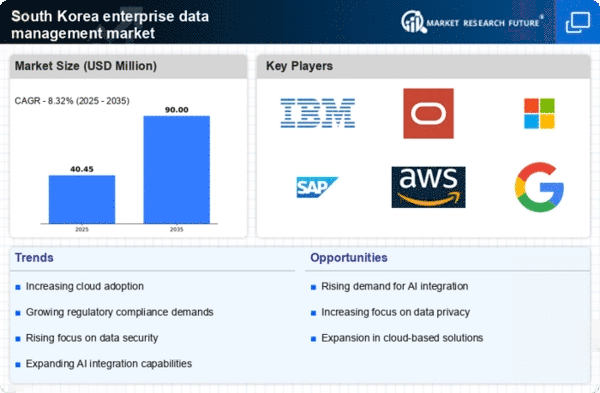Emphasis on Data Governance and Quality
In South Korea, the enterprise data-management market is significantly influenced by the heightened emphasis on data governance and quality. Organizations are increasingly aware of the risks associated with poor data management practices, which can lead to compliance issues and operational inefficiencies. A recent survey indicates that around 65% of South Korean companies are investing in data governance frameworks to ensure data accuracy and reliability. This focus on data quality not only enhances operational performance but also fosters trust among stakeholders. Consequently, the enterprise data-management market is poised for growth as businesses seek robust solutions that support effective data governance and quality assurance.
Adoption of Advanced Analytics and BI Tools
The enterprise data management market in South Korea is witnessing a marked increase in the adoption of advanced analytics and business intelligence (BI) tools. Organizations are leveraging these technologies to extract actionable insights from their data, driving strategic decision-making. Approximately 75% of enterprises in South Korea are investing in advanced analytics capabilities, reflecting a growing recognition of the value of data-driven insights. This trend is likely to propel the enterprise data-management market forward, as businesses seek to enhance their analytical capabilities and improve overall performance through informed decision-making.
Rising Demand for Real-Time Data Processing
The enterprise data management market in South Korea is experiencing a notable surge in demand for real-time data processing capabilities. Organizations increasingly recognize the necessity of timely data insights to enhance decision-making processes. This trend is driven by the growing reliance on data analytics for operational efficiency and competitive advantage. According to recent statistics, approximately 70% of enterprises in South Korea prioritize real-time data capabilities, indicating a shift towards more agile data management solutions. As businesses strive to respond swiftly to market changes, the enterprise data-management market is likely to expand, with investments in technologies that facilitate real-time data integration and analysis.
Expansion of Regulatory Compliance Requirements
The enterprise data management market in South Korea is being shaped by the expansion of regulatory compliance requirements. As data privacy laws become more stringent, organizations are compelled to adopt comprehensive data management strategies to ensure compliance. The introduction of regulations such as the Personal Information Protection Act (PIPA) has heightened the need for effective data management solutions. Approximately 60% of enterprises report that compliance with data regulations is a top priority, driving investments in enterprise data-management technologies. This regulatory landscape creates opportunities for market growth as businesses seek to implement solutions that facilitate compliance while managing their data assets effectively.
Growing Importance of Data Integration Solutions
The enterprise data management market in South Korea is increasingly characterized by the growing importance of data integration solutions. As organizations accumulate vast amounts of data from diverse sources, the need for seamless integration becomes paramount. Businesses are recognizing that effective data integration enhances operational efficiency and enables comprehensive analytics. Recent data suggests that over 55% of South Korean enterprises are prioritizing investments in data integration technologies to streamline their data workflows. This trend indicates a shift towards holistic data management approaches, positioning the enterprise data-management market for substantial growth as companies seek to unify their data environments.
















